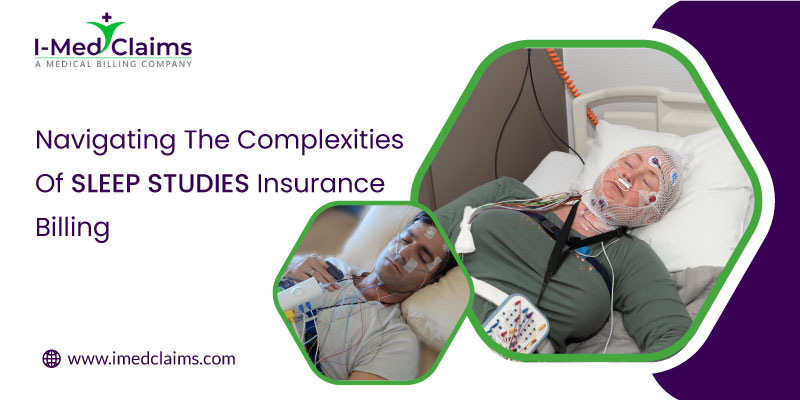According to a research study by the American Academy of Sleep Medicine, approximately 25 million adults in the United States suffer from obstructive sleep apnea (OSA), with many undiagnosed and untreated cases. Polysomnography and sleep studies are commonly used to diagnose OSA and other sleep disorders and are challenging for patients and healthcare providers. Insurance coverage can vary, leaving patients to navigate inconsistent billing policies despite the significant health risks of untreated OSA.
What Is Sleep Study?
A sleep study is an overnight exam that monitors your brain and body while you sleep. Doctors use the survey to identify disruptions in your sleep patterns and measure things like oxygen levels and heart rate. The study is non-invasive and occurs in a sleep lab, usually in a hospital or sleep center. A technologist will collect the data, which your doctor will evaluate later. You’ll discuss the results with your doctor in a follow-up appointment about two weeks after the study.
The cost of a sleep study depends on the testing type and the facility providing the service. Generally, smaller clinics charge less than larger hospital systems. Therefore, contacting the clinic for the most accurate cost information is advisable.
Understanding Insurance Coverage for Sleep Studies
The responsible amount of money will be determined by your insurance plan. You should contact your insurance provider to find out if sleep study coverage is included in your plan. Insurance coverage for polysomnography and sleep studies can vary depending on the patient’s insurance policy and the specific diagnostic test being performed.
Standard insurance policies that cover sleep studies include Medicare, Medicaid, and private health insurance. Medicare typically covers polysomnography for patients who meet specific criteria, such as having sleep disorder symptoms. Private health insurance policies may also cover these tests, but coverage criteria and requirements vary widely depending on the patient’s plan.
It is essential to carefully review the specific coverage criteria for each patient’s insurance policy to ensure that the sleep study is covered and to minimize out-of-pocket costs for the patient. Healthcare providers must also work closely with insurance companies to obtain preauthorization and provide timely service reimbursement.
Medicare Payment for Sleep Tests
When sleep tests are performed in freestanding facilities, Medicare pays for them under the Medicare Physician Fee Schedule and the Outpatient Prospective Payment System when performed in a hospital outpatient department. Standardized codes, known as Current Procedural Terminology codes, must be used by providers to identify the service. Some conditions that qualify for coverage include narcolepsy, obstructive sleep apnea, impotence, and parasomnias. Diagnostic nocturnal penile tumescence testing may be covered under limited circumstances to determine whether erectile impotence is organic or psychogenic.
Technical and Professional Components
All PSG services consist of two parts: the administration of the test, which is the technical component, and the provider’s interpretation of the test, which is the professional component. Modifier codes, -TC or -26, are used by providers to indicate whether the billing is for the technical or professional component respectively. Providers who bill for a global service receive payment for technical and professional components.
Healthcare providers may also need help obtaining timely reimbursement for their services, impacting their ability to provide high-quality care to their patients. Therefore, it is essential to understand the intricacies of insurance billing for polysomnography and sleep studies to ensure that patients receive the care they need and healthcare providers can operate their practices efficiently.
Billing Process For Polysomnography And Sleep Studies
There are following steps included in the polysomnography billing procedure are as follows:
Submitting claims
Healthcare providers must submit claims to insurance companies or government programs to bill for polysomnography and sleep studies. These claims typically require the appropriate diagnosis and procedure codes and supporting documentation.
Coding
Healthcare providers must use the appropriate codes when billing for polysomnography and sleep studies. Current Procedural Terminology (CPT) and International Classification of Diseases (ICD) codes are the most common codes used.
Supporting documentation
Healthcare providers must include all necessary documentation, such as medical records, test results, and referral forms, to support the claims for polysomnography.
Common Challenges In Insurance Billing For Sleep Studies
Incorrect diagnosis codes
One standard billing challenge is incorrect diagnosis codes, which can result in claim denials or delays. Healthcare providers should always double-check that they are using the most accurate and up-to-date diagnosis codes.
Incomplete documentation
Submitting incomplete documentation can also lead to claim denials or delays. Healthcare providers should ensure that all necessary supporting documentation is included with the claim.
Lack of medical necessity
Insurance companies and government programs may deny claims if they determine that the polysomnography or sleep study was not medically necessary. To address this challenge, healthcare providers should document the medical necessity of the test in the patient’s medical record.
Denied Claims
Insurance providers may deny claims due to insufficient documentation or lack of medical necessity. Providers can appeal denied claims with additional documentation or by showing medical conditions. Obtaining prior authorization from insurance providers can help avoid denied claims and ensure coverage.
Lack of Coverage
Some insurance plans may not cover specific sleep study procedures, leaving patients to pay out-of-pocket. To avoid surprises, providers can educate patients on their insurance coverage and potential out-of-pocket expenses.
Final Thoughts
Navigating the complexities of insurance billing for polysomnography and sleep studies can be daunting. It is essential to understand that the cost of a sleep study varies depending on the type of testing and the facility providing the service. Finally, it is recommended to contact your insurance provider to find out if sleep study coverage is included in your plan and whether appealing a denial of coverage is an option. Taking these steps and seeking help from your doctor or insurance provider when necessary can make insurance billing for polysomnography and sleep studies more manageable.


